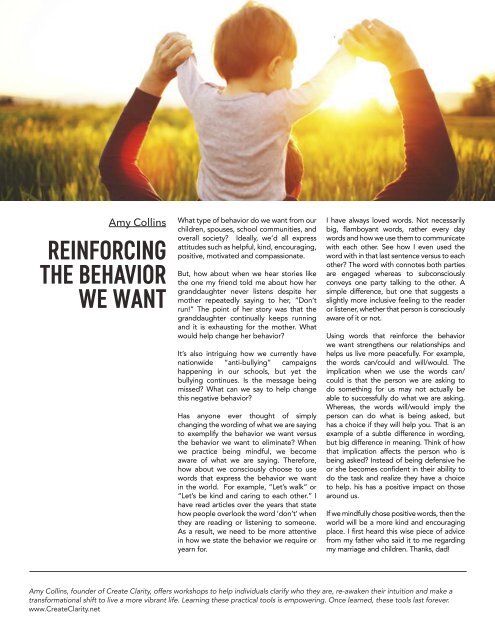24 Seven January 2018
Change Your Attitude… Change Your Life: 24/seven is a monthly, free magazine for personal growth, professional development, and self-empowerment. The approach is holistic, incorporating mind, body, soul, and spirit. As philosopher Francis Bacon said, “Knowledge is power.” Use this information to live your best life now.
Change Your Attitude… Change Your Life: 24/seven is a monthly, free magazine for personal growth, professional development, and self-empowerment. The approach is holistic, incorporating mind, body, soul, and spirit. As philosopher Francis Bacon said, “Knowledge is power.” Use this information to live your best life now.
You also want an ePaper? Increase the reach of your titles
YUMPU automatically turns print PDFs into web optimized ePapers that Google loves.
Amy Collins<br />
REINFORCING<br />
THE BEHAVIOR<br />
WE WANT<br />
What type of behavior do we want from our<br />
children, spouses, school communities, and<br />
overall society? Ideally, we’d all express<br />
attitudes such as helpful, kind, encouraging,<br />
positive, motivated and compassionate.<br />
But, how about when we hear stories like<br />
the one my friend told me about how her<br />
granddaughter never listens despite her<br />
mother repeatedly saying to her, “Don’t<br />
run!” The point of her story was that the<br />
granddaughter continually keeps running<br />
and it is exhausting for the mother. What<br />
would help change her behavior?<br />
It’s also intriguing how we currently have<br />
nationwide “anti-bullying” campaigns<br />
happening in our schools, but yet the<br />
bullying continues. Is the message being<br />
missed? What can we say to help change<br />
this negative behavior?<br />
Has anyone ever thought of simply<br />
changing the wording of what we are saying<br />
to exemplify the behavior we want versus<br />
the behavior we want to eliminate? When<br />
we practice being mindful, we become<br />
aware of what we are saying. Therefore,<br />
how about we consciously choose to use<br />
words that express the behavior we want<br />
in the world. For example, “Let’s walk” or<br />
“Let’s be kind and caring to each other.” I<br />
have read articles over the years that state<br />
how people overlook the word ‘don’t’ when<br />
they are reading or listening to someone.<br />
As a result, we need to be more attentive<br />
in how we state the behavior we require or<br />
yearn for.<br />
I have always loved words. Not necessarily<br />
big, flamboyant words, rather every day<br />
words and how we use them to communicate<br />
with each other. See how I even used the<br />
word with in that last sentence versus to each<br />
other? The word with connotes both parties<br />
are engaged whereas to subconsciously<br />
conveys one party talking to the other. A<br />
simple difference, but one that suggests a<br />
slightly more inclusive feeling to the reader<br />
or listener, whether that person is consciously<br />
aware of it or not.<br />
Using words that reinforce the behavior<br />
we want strengthens our relationships and<br />
helps us live more peacefully. For example,<br />
the words can/could and will/would. The<br />
implication when we use the words can/<br />
could is that the person we are asking to<br />
do something for us may not actually be<br />
able to successfully do what we are asking.<br />
Whereas, the words will/would imply the<br />
person can do what is being asked, but<br />
has a choice if they will help you. That is an<br />
example of a subtle difference in wording,<br />
but big difference in meaning. Think of how<br />
that implication affects the person who is<br />
being asked? Instead of being defensive he<br />
or she becomes confident in their ability to<br />
do the task and realize they have a choice<br />
to help. his has a positive impact on those<br />
around us.<br />
If we mindfully chose positive words, then the<br />
world will be a more kind and encouraging<br />
place. I first heard this wise piece of advice<br />
from my father who said it to me regarding<br />
my marriage and children. Thanks, dad!<br />
Amy Collins, founder of Create Clarity, offers workshops to help individuals clarify who they are, re-awaken their intuition and make a<br />
transformational shift to live a more vibrant life. Learning these practical tools is empowering. Once learned, these tools last forever.<br />
www.CreateClarity.net


















